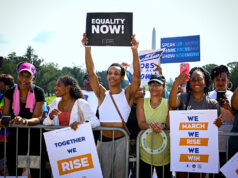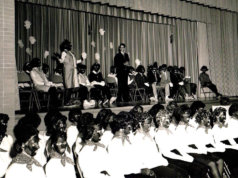
A now-viral New York Times op-ed by Sabrina Tavernise spells out a disturbing refrain I have heard for a few weeks now. It begs the question: Should those outraged and horrified at the multitude of injustices that come flying into our purview daily, from not only the new Donald Trump administration but its supporters, attempt to communicate our resistance in more palatable and easily digestible ways?
The answer for me is an unequivocal, “No!” There is no such obligation.
The insistence on a measured, rational and gentle presentation of one’s political or ideological opinion is of course a necessity on a debate stage, which is, for all intents and purposes, a form of theater designed to illustrate the rhetors’ masterful understanding of a topic and flaunt their finesse of language and argumentation. This form of communication has its roots in ancient Greece and is another way of interacting in the world created by educated white men (at the exclusion of women or other racial minorities who were not allowed in the academy — but more on this in a moment).
When faced with a very real-life affront to a fundamental aspect of one’s identity — such as a racially, religiously, sexually or gender-based aggression or a political or religious ideology that directly marginalizes or debases those identities — we cannot and should not expect people to “engage calmly” in the face of overt hatred and oppression.
Supporters of status quo unlikely to flip
First, most of us are unconvinced by baiting claims like, “I might be willing to change my mind if you weren’t so upset about it,” or, “Liberals are just waiting to jump down your thrown at any little ‘microaggression,'” (a comment made by a student in a class of mine when talking about how some white conservatives feel afraid to talk about anything for fear of being attacked). While he was able to recognize that such a claim reeks of white fragility, it also echoes the proliferation of the liberal-as-crazy-emotional archetype that is minimizing, patronizing and silencing.
Political affiliation aids these requests for racial, sexual, gender or religious minorities to tone down their messaging when expressing outrage at injustices that directly affect their identities. It is a form of victim blaming. Telling someone with those identities, “I might listen to you and change my oppressive political opinion if you were less emotional about it,” is privileged and probably a lie if research about changing political opinions is correct.
Statistically, people rarely change their minds about much of anything due to psychological defenses like cognitive dissonance. As a result, the angry liberal’s cries often receive answers in the vein of, “Stop crying for/about oppression, ’cause I don’t really care all that much.”
Rationality as a virtue
The value of emotional regulation as virtuous goes back to the Big Daddy of western philosophy, Aristotle, who along with setting the philosophical (and political) tone for the West also created a problematic, reductionist binary philosophical universe. In this universe, reason and rationality were associated with truth and masculinity, but emotion and intuition were associated with femininity and falseness — an intellectual setup that has had nefarious consequences for women for millennia.
The expectation of rational, calm-but-spirited-yet-polite debate has indeed become a feature of civilized political engagement in the United States and has deep colonial roots. Quite often the “barbaric” and emotional displays of the slaves during their funeral ceremonies or the impassioned rituals of the Native Americans were seen as antithetical to reasonable, rational and civilized discussion and decorum. As such, these rituals and their performers were something not only foreign, exotic and “othered” but, quite literally, a threat to the stability of western life.
America’s pilgrims would grin with restrained pleasure that the puritanical inheritance of emotional restraint is still being touted some 400 years later.
Eluding the ‘Gandhi expectation’
I call the expectation of calm debate in real life the “Gandhi expectation” in my classes. While great men like Gandhi and Martin Luther King Jr. have received cult-of-personality status in their Yoda-like ability to face oppressive violence with elegant calm and resolve, this is not everyone’s psychological reality. Besides, there is more than one way to effect change outside of this highly masculinized, stoic ideal of activism.
Marginalized people are not under any obligation to explain to anyone why transgressing one or more of their identities is problematic, offensive or hurtful. They may choose to do so calmly (a la Gandhi), or they may simply be pissed and feel like crying, yelling, cursing, leaving or protesting the hell out of whatever is in front of them.
Calm down, things could get violent
Of course, there is the fear that if one expresses their emotions authentically, the threat of physical violence increases. In some cases this may be true, but to assume just because someone becomes emotional they will become violent is a byproduct of emotional repression. Yes, bottled emotional energy can be violent and erupt with dangerous consequences (just go to a Trump rally to see the bottled fear and anger of the white rural American bubble to the surface).
In the emotionally restrained model, free and open expression means chaos, and chaos is to be avoided at all costs.
Historically, the unbounded “irrational” expression of the marginalized was a subversive act of rebellion against the imposed restraint of the West: breaking out into song while protesting loudly outside a segregated school when police are standing with batons ready to strike; the suffragist refusing to eat so she could gain the right to vote. These actions are indeed “irrational” and “unreasonable” but were also valid and that ended up being impassioned, highly effective responses to oppression.
When emotions fight the power
These patriarchal, colonial and misogynistic inheritances have shaped our modern consciousness and underlie our preconceptions about engagement, communication and dialogue. They surface when emotional authenticity and unmitigated expression threatens the status quo and, particularly, when injustice sparks outrage. When long-standing power structures are threatened, the requests to quiet down and stop whining get even louder. We need look no further than the daily news to see this principle at work: The conservative pundit chastises female protesters and their angry, vile signs, or the ignorant straight white man can’t understand why trans people get upset when they just want to use the bathroom.
The plea to quiet down and play nice has very little to do with having a dialogue and more to do with maintaining established power structures.
So again, no: Don’t expect marginalized people or their allies to temper their emotions or “calm down” when talking about immigration bans or pro-life laws or “law and order” rhetoric. Don’t expect indigenous people to remain calm when corporate growth and political greed threaten their sacred lands. Don’t expect sexual assault survivors to sit down and smile sweetly as they rationally outline why the President’s election was an affront to their psychological and physical safety.
And to those who are threatened with this kind of silencing: Yell, scream and cry, because your emotions are real expressions of a lived experience. There’s no obligation to curtail an expression of your reality just to make someone else comfortable. In many cases, that same request to maintain their comfort is also a request to maintain your oppression.





















